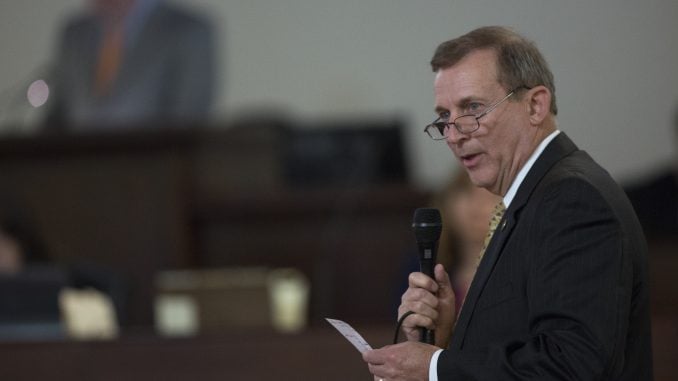
RALEIGH The N.C. Senate passed a $22.9 billion state budget early Friday morning, focusing spending efforts on raises for state employees, including teachers and principals, community health centers, and tax cuts. Rules dictate that a third reading and final passage of the budget, before it heads to the House for reconciliation, must not be held before the next calendar day. The senate is scheduled to return to session just after midnight Friday to hold the third and final vote for the upper chamber’s budget proposal.”I am proud this budget delivers nearly $1 billion in tax relief, continues our multiple-year effort to dramatically increase teacher pay and improve education outcomes, and helps rebuild communities devastated by Hurricane Matthew while bolstering our state’s rainy day fund to its highest total ever,” said Senate President pro tem Phil Berger (R-Rockingham) after the second successful vote.The plan boosts spending by 3.5 percent over the actual amount the government spent last year, and according to Berger it will include “across-the-board” teacher raises.”It is consistent with what we’ve done thus far in trying to get to the point where a teacher gets to the top of the [pay] scale in 15 years,” said Berger. “We don’t quite get there in this [budget], but we are moving in that direction.”Senate leaders are providing about $600 million more for public education, and would like to award teachers an average 3.7 percent raise this year and 9.5 percent raise over two years.The proposal includes a new plan that will allow teachers licensed in STEM and special education, and those that accept positions in low-performing schools to begin at a higher pay grade on the salary schedule.It also aims to recruit and retain highly qualified principals, with $28.5 million in pay boosts for principals and assistant principals, including an opportunity for principals to earn up to $15,000 in bonuses.Consistent with years past, Senate leadership committed to continued tax relief by proposing to decrease the personal income tax rate from 5.499 to 5.35 percent in 2018, and increasing the amount of income that is exempt from state income tax.The thriving business community in North Carolina will also see continued tax cuts if the Senate plan moves forward, lowering the corporate income tax rate from 3 percent to 2.75 percent in 2018, and to 2.5 percent in 2019.When the budget proposal was initially released on Tuesday, Cooper attacked senate leadership for tax cuts, among other spending priorities.”Unfortunately, Senate Republicans have prioritized yet another massive tax giveaway for corporations and the wealthiest that would give millionaires a tax cut 60 times larger than middle-class families,” Cooper spokesman Ford Porter reportedly wrote in a statement to ABC11, a local Raleigh television station. “Their plan blows a $600 million hole in our budget, which wrecks our ability to invest in education, disaster recovery and other priorities. Those are not the right priorities for our state.”The budget process is bound to differ from recent years as Democratic Gov. Roy Cooper now sits in the Executive Mansion. Cooper and the legislature have publicly agreed in principle on focusing state resources on education. However the amounts are different. Cooper released his budget recommendations last month, which proposed spending $23.5 billion in the first year of the biennium increasing to $24 billion in the second year.”It is telling that the only criticisms we’ve heard about this budget are it ‘doesn’t spend enough’ and ‘gives taxpayers back too much of their own money’,” said Berger in response to Cooper’s criticism. “But rather than indulge the old tax-and-spend impulses that dragged our state into a $2.5 billion budget deficit and one of the nation’s worst tax climates, we are spending prudently on core priorities, saving carefully to protect against the next recession and returning a portion of the tax surplus back to the middle-class families and job-creators who paid it.” The plan also appears to include some policy statements including an effort to raise the age of juvenile convictions as an adult from 16 to 18. The issue has been resonating across state government, garnering support from the N.C. attorney general, the judicial branch and the N.C. House which has passed a bill as separate legislation. The Senate budget also creates a new executive level Department of Adult Correction and Juvenile Justice to manage the proposed changes.”It’s a priority of the Senate, and the budget is a document that sets forth priorities,” Berger said, later indicating that one way or another “something will be done” about the raise the age issue this year.Further, the senate budget also includes partial repeals and multiple exemptions from the State’s Certificate of Need (CON) laws that regulate the construction, expansion, and improvements to medical facilities.Advocates of CON repeal such as Sen. Ralph Hise (R-Madison) argue that the laws arbitrarily limit access to and raise the cost of health care due to stifled supply and demand dynamics. The plan exempts from CON review the construction, acquisition, or establishment of ambulatory surgical facilities if certain conditions are met, while also exempting certain specific surgical procedures from the regulations.The budget also provides $150 million in disaster relief assistance to victims of Hurricane Matthew and upgrades the Controlled Substance Reporting System so doctors and pharmacies can better track prescriptions. It also allocates $15 million over two years to community health centers, rural health centers, free clinics and other health services that focus on uninsured rural communities.The House budget is due to be released next. The two chambers alternate each year taking the first stab at a state budget. After the House passes its budget, conference committees will reconcile differences in the chambers’ budget proposals, at which point the consensus budget will be sent to Cooper for signature. Lawmakers have stated they plan to pass a budget and adjourn the 2017 session by mid-June.



